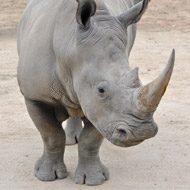Gove ‘cautious’ about trophy hunting import ban

Under current legislation, trophy hunters can legally bring body parts back into the UK with a special permit.
The UK government will not be banning imports from trophy hunting yet, environment secretary Michael Gove has said, as conservation charities have advised him to “proceed with caution”.
Trophy hunting allows people to pay to take part in hunts and keep a ‘trophy’, such as the head or skin. Under current legislation, trophy hunters can legally bring body parts back into the UK with a special permit. Whilst many view the practice as a bloodsport and are calling for a ban, others claim it raises money for conservation.
During a new BBC Radio 5 Live podcast, Beast of Man, Mr Gove was asked why the UK has not yet enforced a ban. He said conservationists and charities had advised him to exercise caution.
“I think that there is growing momentum for the law to change,” he explained. “But what I don’t want to do is to get ahead. I don’t want to be in a position where I am running so far in advance of what other charities and other leaders want, that we risk the good relationship that’s been built up over time…
“If particular communities have got used to driving income from hunting, you don’t want to seem as though you’re basically saying, we’re taking your livelihood away. We’ve got to make sure that there is a clear alternative, that they know that their livelihoods and their lifestyle are going to be respected and not patronised, before they will feel comfortable about moving.”
Last year more than 50 celebrities signed an open letter in support of the Campaign to Ban Trophy Hunting, which urged the government to ban imports from trophy hunting into Britain. Meanwhile, a cross-party Early Day Motion was signed by over 159 MPs calling for a ban on trophy hunting imports from endangered species.
Save the Rhino, which has not been involved in discussions with the government, has argued that while trophy hunting is a highly controversial issue, many conservationists now recognise that legal, properly regulated operations have a ‘valid role’ in overall rhino conservation strategies.
In a position piece on the subject, the charity said huge sums of money are needed for rhino conservation, including intensive anti-poaching patrols, but tourism and donations do not provide sufficient funds to protect and grow the population. According to the charity, white rhino numbers have risen from 1,800 to over 20,000 since the country permitted limited hunting in 1968, and the practice has offered an incentive for private landowners to keep rhinos.
However, it recognises that the system can be open to abuse and states that trophy hunting income alone will not solve the poaching crisis.
Meanwhile, Dr Mark Jones, head of policy at the Born Free Foundation, said he “strongly refutes” claims that trophy hunters take only ‘problem’ or redundant’ animals, as he believes they typically set their sights on animals with impressive traits, which results in key individuals being removed from the ecosystem. Furthermore, “little if any of the money hunters pay to make their kills ever filters down to local communities or conservation bodies.”
He added: “Banning the importation of hunting trophies from threatened species is an action the UK government can and should take without delay, as part of a commitment to safeguard the conservation and welfare off the world’s diminishing wildlife.”



 HMRC has invited feedback to its communications regarding the employment status of locum vets and vet nurses.
HMRC has invited feedback to its communications regarding the employment status of locum vets and vet nurses.